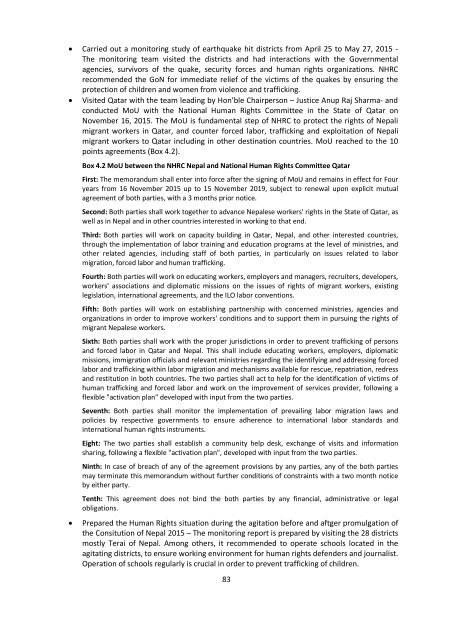TRAFFICKING IN PERSONS
1Spfyta
1Spfyta
Create successful ePaper yourself
Turn your PDF publications into a flip-book with our unique Google optimized e-Paper software.
Court order of mandamus and other appropriate orders for the effective implementation of the<br />
provisions of the FEA 2007. In ‘People Forum for Human Rights (people Forum) vs. Government<br />
Nepal’ case registered in Supreme Court in August 14, 2014, the petitioner, Mr. Shom Prasad Luitel<br />
from People Forum, demanded the effective implementation of the provisions for i) decentralization<br />
of foreign employment services (DoFE, FEPB and FET) as it is difficult to make complaints about fraud<br />
or deception to those residing in remote areas; ii) application of summary procedure in – speedy<br />
decisions in relation to cases related to foreign employment and iii) effective monitoring of<br />
recruiting agencies and agents and their punishments per the law.<br />
Pravasi Nepali Coordination Committee (PNCC) – Established in 2009, PNCC has been working on<br />
safe migration areas. Its website is: www.pncc.org.np. It works in prevention, protection,<br />
prosecution and coordination and networking and collaboration areas. As prevention activities, it<br />
provides counselling, disseminate information regarding safer migration. In the FY 2013/14 and<br />
2014/15, it worked in 23 districts in its SaMi Project districts (16) and PNCC 7 districts: Chitawan,<br />
Jhapa, Mahottari, Makwanpur, Palpa, Kanchanpur, Rukum, Nawalparasi, Sarlahi, Khotang, Dhanusha,<br />
Dang, Sindhuli, Sindhupalchok, Saptari, Sunsari, Kaski, Kailali, Ramechhap, Nuwakot, Dhading, Siraha<br />
and Udayapur.<br />
• Provided formal/non-formal education to 1469 persons in FY 2013/14 and 1382 in FY<br />
2014/15<br />
• Conducted awareness raising programs at the community level benefing to 4203 persons in<br />
FY 2013/14, 5972 in FY 2014/15 and to 1372 persons after three months of the April<br />
Earthquake<br />
• Conducted lobbying and adovacy benefiting 710 persons in FY 2014/15 and 60 persons after<br />
three months of the April Earthquake<br />
• Provided information on safe-migration to 4203, 5972 and 2858 persons in the FY 2013/14,<br />
2014/15 and after the three months of April earthquake, respectively, through its<br />
Information Booths of Kaulalampur of Malaysia, Doha of Qatar and Different CDO offices of<br />
Nepal. Among the persons received safe migration information, 1864, 1286 and 365 persons<br />
were provided coordination services for rescue in the FY 2013/14, 2014/15 and after the 3-<br />
months of earthquake. Similarly, a total of 32, 136 and 26 persons were provided safe<br />
shelters in FY 2013/14, 2014/15 and after the earthquake.<br />
Pourakhi Nepal – It is one of the leading NGOs led by migrant returnee women working on safe<br />
migration issues in Nepal. Pourakhi has currently two projects which are directly dealt in trafficking<br />
issues. One project entitled (CTIP) “Combating Trafficking in Person” is implementing at<br />
Sindhupalchowk district and another one project named “Work in Freedom-Community Base<br />
Intervention for Women Empowerment and Prevention of Trafficking in Person” is implementing at<br />
Dolakha district. It conducted basically different prevention related programs including supporting<br />
the formation of Village Committees for controlling human trafficking. A the national level, Pourakhi<br />
Nepal is continuous carrying out lobbying and advocacy to increase law enforcement efforts against<br />
all forms of trafficking; suportinng government for raising anti-trafficking efforts, activtation of the<br />
DCCHT.<br />
II. NGOs Mainly Involved in Anti-Trafficking, Women Empowerment Issues<br />
Alliance Against Trafficking in Women and Children in Nepal (AATW<strong>IN</strong>) – It was established in 1997<br />
as a network organization of NGOs working in Nepal in order to raise collective voice against the<br />
human trafficking. Currently, there are 33 organizations in the network. AATW<strong>IN</strong> has been working<br />
for the policy change in local, national to international level. The role of the AATW<strong>IN</strong> has also been<br />
recognized by the GoN as reflect in the textbook of grade 10 and +2 of Population and Health<br />
Subject. AATW<strong>IN</strong> mainly worked in areas of lobbying and campaign for the SAARC Convention on<br />
preventing and combating trafficking in women and children; advocating in policy level to formulate<br />
85


